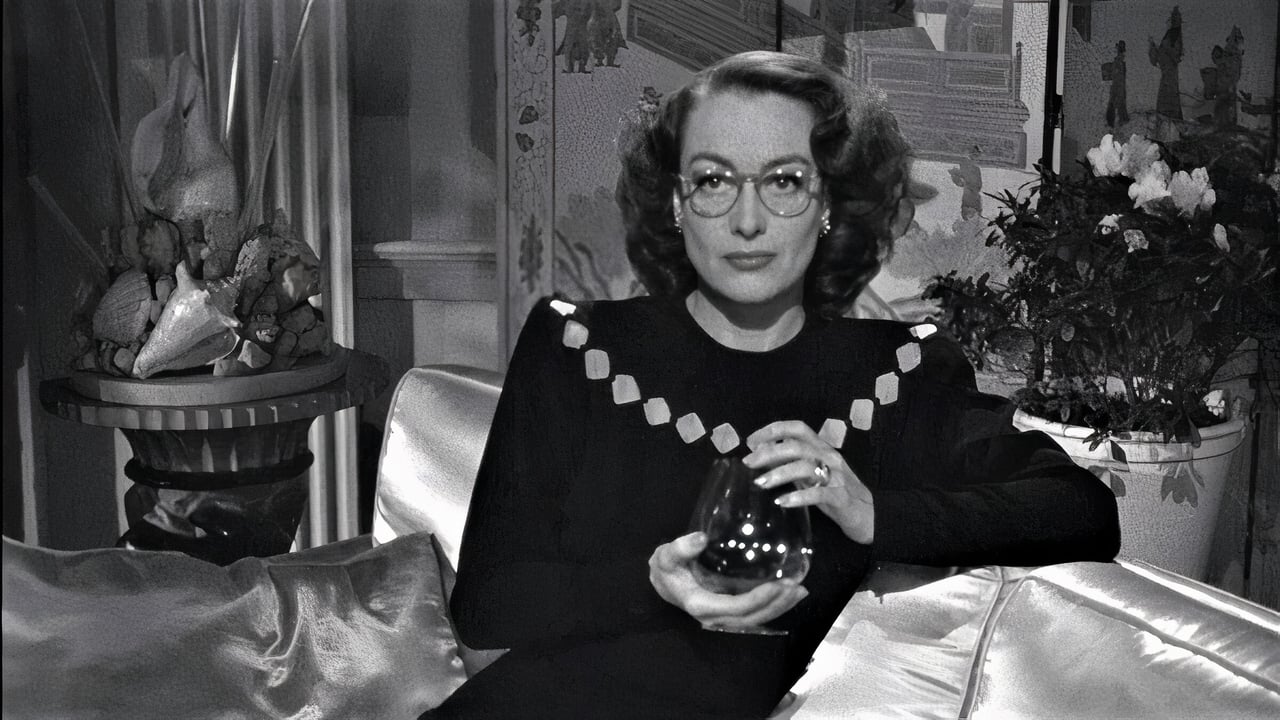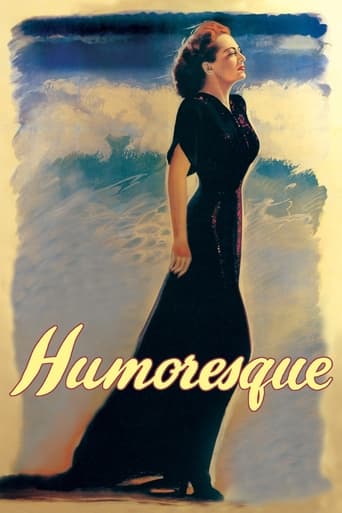

Self-important, over-dramatic, uninspired.
... View MoreBad Acting and worse Bad Screenplay
... View MoreWhile it doesn't offer any answers, it both thrills and makes you think.
... View MoreOne of the film's great tricks is that, for a time, you think it will go down a rabbit hole of unrealistic glorification.
... View MoreWhen this film first came out in 1946, radio comics told jokes about it. The jokes centered on John Garfield, who had a filmography of nothing but tough guy parts, playing a classical violinist. These jokes were probably publicity plants, but they do point out a problem with the movie. Garfield carries with him a long established persona of a socially engaged tough guy and this history sabotages his attempt to play an ethereal, over-mothered, nerdy, self obsessed artist. I keep expecting him to punch someone. There is also the shadow issue of his sexuality. The childhood mentor with whom he lives, when asked about the nature of their relationship, answers that it is identical to the one between George Sand and Chopin. Huh? How did that one get past the censors? Joan Crawford does give one of her best performances, but it was a clearly a performance. I appreciated the effort Crawford put into it. She just misses. Part of the problem is the script. She is as much plot device as a fully fleshed out character. Why is she so over emotional? Her over-reaction at the end-and, boy, what an over-reaction- is not forecast by her earlier casual dismissals of her husband and her boy toys.But the film is very high level melodrama. The swelling music behind key scenes fits in. A compelling story is told well. Oscar Levant's one liners are great until they begin to grate. The cast does a uniform good job. Thus, Humoresque is well worth seeing, even if it falls short of being a classic.
... View MoreIn the mid 1940s, Hollywood suddenly got the classical music bug and a whole string of lush melodramas were made, among them Columbia's 'A Song to Remember' (a risible biopic of Chopin with Cornel Wilde and Merle Oberon that, in one famous scene, gave Liberace his entire act), MGM's 'Song of Love' (a biopic of Schumann with Robert Walker and Katherine Hepburn) and 'Carnegie Hall' (a film about the famous hall with a dumb plot, stuffed with cameos from the musical greats of the day which is its chief value now).The two best films of the cycle however,'Deception' and 'Humoresque' were made at Warner Brothers, almost simultaneously, and starring those arch rivals Bette Davis and Joan Crawford respectively. Warners had by far the best and most interesting music department in Hollywood then, with (at this time) the three titans of film music working there - Max Steiner, Erich Wolfgang Korngold and Franz Waxman. Max superbly handled the Warner biopics of Gershwin (Rhapsody in Blue 1945) and Cole Porter (Night and Day 1946), Korngold did a superb job on'Deception' and Waxman was in charge for this film.HUMORESQUE is a remarkable example of a film treatment that transcends its material. I won't repeat the many deficiencies in plot and story development that others have noted in their reviews here. They must have been clichéd even in 1946. What makes this film eminently watchable is the wonderful direction and cinematography that richly showcases a New York that no longer exists (and that was recreated in Burbank with aplomb!) and which presents the stars of the film in some of the most erotic and sumptuous photography of the era.Some shots must have taken hours to set up and light properly. Check out the moment at Helen Wright's party early in the film ["She's as complex as a Bach fugue"], where she meets Paul Boray for the first time ("Bad manners Mr Boray: the infallible sign of talent").After he insults her and launches into Rimsky-Korsakov's 'Flight of the Bumble Bee', she walks off in a temper, to the bar, to pour herself yet another brandy and as she holds the large brandy glass in her hand, Ernest Haller somehow allows us to see Boray directly through the glass with both Garfield and the glass in perfect focus. It's an astonishing shot, an obvious visual metaphor to be sure, showing how Mrs Wright wishes to control Boray from now on - but, what a stunning effect! Negulesco is equally inventive and manages some very deft combinations of sound-stage and location footage, especially at Wright's beach house. He also films the musical sequences wonderfully well, ably convincing us that Garfield is really playing, borrowing the trick (from 'Deception' being shot on adjoining stages) of using two real musicians out of camera shot for the fingering and bowing and even Isaac Stern himself for close ups of the left hand.The music is superbly performed and recorded, and the repertoire is well chosen. That applies not only to the classics. Peg La Centra's contribution, singing great standards of the 1930s and early 40s, is so evocative, one really wants to go to Teddy's Bar right away, for a large Martini. I bet he made a good one.The finale of the film borrows from that of 'A Star is Born' but elevates the whole suicide idea to an extravagant degree. According to an interview Negulesco gave late in life (that appears in a book called 'The Celluloid Muse') the idea to use the Liebestod from Wagner's Tristan and Isolde, (transcribed for violin), was actually Oscar Levant's and annoyed Franz Waxman, who had other ideas. In the end, he acquiesced and produced a stunning transcription that works extremely well as a concert work. Stern never commercially recorded it (unlike the Carmen Fantasie, another gem from this score) but his performance on the soundtrack is outstanding. What a pity no original optical track survives in the Warner vaults.With its ripe dialogue, a great supporting cast, some of the most voluptuous photography in any 1940s film and a fabulous musical soundtrack, HUMORESQUE repays repeated viewings and is a classic of its kind.It's the kind of film that could not be made today - but let us be grateful that once upon a time in Hollywood, there was the talent around that could make it, .....and very well indeed.
... View MoreWith the help of a neurotic patroness, a poor violinist achieves fame and fortune, but can their stormy relationship survive? Garfield reached the peak of his brief career, appearing in this, "Body and Soul," and "Gentleman's Agreement" in succession. He is well cast as the driven, arrogant fiddler. Crawford is also well suited to the role of the benefactor, going for the melodramatics as only she could. Levant provides hilarious comic relief as a wise-cracking pianist. Naish and Nelson are excellent as Garfield's parents. Much of the screen time is devoted to extended excerpts from some of the greatest music ever written for the violin, a treat for classical music lovers.
... View MoreCliff Odets, Joan Crawford and John Garfield is an almost unbeatable parlay. Odets and Garfield were both members of the Group Theatre on Broadway in the thirties - other members were Lee J. Cobb and Elia Kazan - and one of Odets' most successful plays was Golden Boy about a poor boy from the East Side who is also a gifted violinist. Odets wrote Golden Boy in 1938, I don't know when Fannie Hurst wrote her short story Humoresque but the similarities are clear except that in Golden Boy the violinist becomes a prizefighter highlighting the conflict between Art and commerce. Whatever, Odets turns in a great script here and Crawford and Garfield play the bejeezus out of it with handy support from Ruth Nelson and Oscar Levant. It's undoubtedly one of Crawford's finest performances even if they do 'borrow' the suicide from A Star Is Born and change the sex. If you're looking for a movie that personifies the forties look no further.
... View More